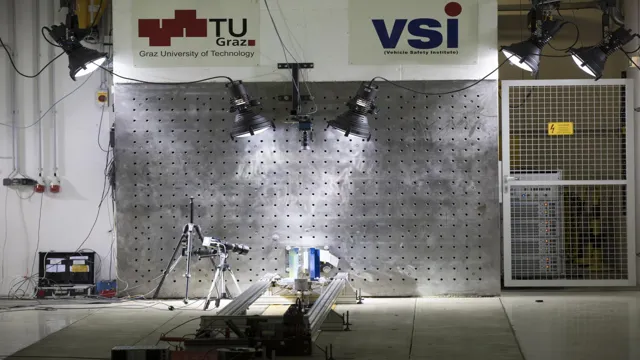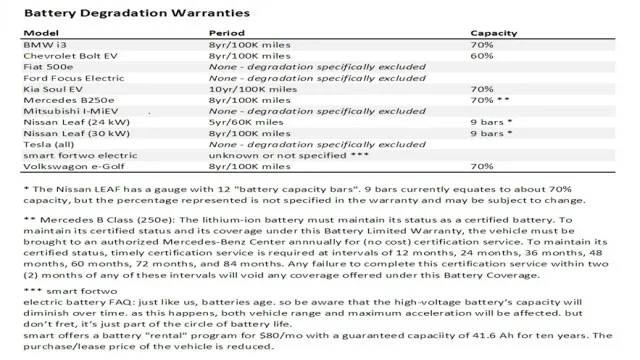Shocking Results: The Electric car battery crash test you can’t afford to miss!
Electric cars are becoming increasingly popular, and with good reason. Not only do they offer a more environmentally friendly mode of transportation, but they can also save you money on gas and maintenance costs in the long run. However, one concern that many people have about electric cars is the safety of their batteries in the event of a crash.
After all, a gasoline car accident may ignite a fire or explosion, but electric cars are powered by a lithium-ion battery pack that can pose unique challenges in case of an accident. That’s where electric car battery crash tests come in. In this blog post, we’ll explore what the data shows about battery safety in electric cars, including the risks, safety features, and what you can do to stay safe on the road.
So, buckle up and let’s dive in!
Overview of Electric Car Batteries
Electric car batteries have become a crucial aspect of the automotive industry, considering the push towards electric vehicles. There has been concern and speculation surrounding the safety of these batteries, leading to the implementation of electric car battery crash tests. These tests assess the durability and stability of the batteries in extreme circumstances such as collisions, high temperatures, and short circuits.
The results of the tests have shown that the batteries are generally reliable, although improvements are continually being made to enhance their overall safety. The electric car battery crash tests are essential in providing assurance to consumers that they are indeed safe to use on the road. Overall, electric car batteries are an important innovation in the automotive industry, playing a vital role in the push towards more sustainable modes of transportation.
Construction of Electric Car Batteries
Electric car batteries are a critical component of electric vehicles. These batteries work by converting stored energy into electricity that powers the vehicle’s motor, which then propels the car forward. The construction of these batteries consists of multiple cells connected in series and parallel to increase voltage and capacity.
Each cell contains an anode, cathode, and electrolyte, and the cells are housed within a protective casing. The most common type of electric car battery is the lithium-ion battery, which is lightweight, durable, and provides a high energy density. Electric car batteries are a significant part of the overall cost of an electric vehicle, but advances in technology have led to a decrease in battery costs and an increase in the range of electric cars.
As the demand for electric vehicles continues to grow, research and development in battery technology are expected to lead to even more efficient and affordable electric car batteries.

How Electric Car Batteries Work
Electric car batteries are the essential component that powers an electric vehicle. These batteries can vary in size and shape depending on the make and model of the car. They are usually made up of lithium-ion cells that are designed to store and deliver energy to the motor of the car.
The batteries are charged by connecting them to an electric charging station or a power outlet. The electrical energy stored in the battery is then delivered to the electric motor, which drives the wheels of the car. Some electric cars also have regenerative braking, which harnesses energy that would otherwise be lost when the brakes are applied.
This energy is then stored in the battery to be used later. The batteries in an electric car are designed to last for several years and can be recycled once they reach the end of their lifespan. Overall, electric car batteries are a highly efficient and sustainable way to power modern transportation while reducing our reliance on traditional fossil fuels.
Crash Testing Electric Car Batteries
When it comes to electric cars, one thing that often concerns people is the safety of the battery in the event of a crash. Fortunately, technology has advanced to the point where electric car batteries can withstand a great deal of impact without bursting into flames or exploding. In fact, many of these batteries are put through extensive crash tests to ensure that they meet safety standards.
These tests involve simulating a variety of different crash scenarios, including frontal collisions, side impacts, and rear impacts, and measuring the battery’s response. Some of the factors that are taken into account include the battery’s structural integrity, the presence of any leaks or fires, and the ability to maintain electrical isolation from the rest of the car. Overall, the results of these tests are reassuring, as they show that electric car batteries can handle crashes just as well (if not better) than traditional gas-powered cars.
Types of Battery Crash Tests
Electric cars have become increasingly popular as they are environmentally friendly and cost-efficient in the long run. However, it is essential to ensure the safety of the battery in case of an accident. Battery crash tests are conducted to evaluate the performance of the battery during a collision.
There are various types of battery crash tests, such as penetration, crush, fire, and vibration tests. The penetration test involves simulating a sharp object penetrating the battery, while the crush test assesses the battery’s ability to withstand pressure and is performed by crushing it between two surfaces. Fire testing is done to check the fire resistance of the battery, while vibration tests are used to assess the battery’s performance during transportation.
These tests are critical in ensuring the safety of electric cars and their passengers in case of an accident.
Impact of Battery Temperature on Crash Test Results
Crash testing electric car batteries can be a major concern as the battery temperature affects the results. If the battery is too cold or too hot, it can lead to unexpected performance and safety issues. Manufacturers take proper safety measures to test the batteries and ensure their optimum functioning, but the temperature of the battery during testing plays a significant role in determining its performance in the event of an accident.
Most manufacturers use temperature control chambers to simulate the environmental conditions and test the batteries at various temperatures. It is crucial to understand the impact of battery temperature on crash testing results so that manufacturers can build safer electric cars that offer reliable performance during accidents. It is also essential for consumers to understand that the battery temperature can affect their vehicle’s performance and take adequate precautions to ensure their safety.
Results of Recent Electric Car Battery Crash Tests
The results of recent electric car battery crash tests have been promising. Many people have been concerned about the safety of electric car batteries in the event of a crash. However, these tests have shown that electric car batteries are less likely to catch fire and are more stable than previously thought.
This is great news for electric car owners and those considering purchasing one. The tests were conducted in various scenarios, including frontal, rear, and side impacts. The findings have been attributed to advancements in battery technology and engineering.
So, not only are electric cars environmentally friendly, they are also proving to be safer than traditional vehicles. If you’re thinking about purchasing an electric car, rest assured that the battery has been rigorously tested for safety.
Safety Implications of Electric Car Batteries in Crashes
When it comes to electric car safety, one of the biggest concerns is how the batteries hold up in crashes. In order to ensure that their vehicles can withstand collisions, automakers run extensive crash tests on their electric cars. These tests not only evaluate the safety of the occupants, but also examine how well the car’s battery is protected.
Electric car batteries are complex and fragile systems that can be easily damaged in a collision, potentially causing serious safety issues. The results of these tests are carefully analyzed to identify any weaknesses or vulnerabilities, and improvements are made to ensure that the batteries can withstand a wide range of impact scenarios. By conducting thorough electric car battery crash tests, automakers can help to ensure that their vehicles are as safe as possible for drivers, passengers, and everyone else on the road.
Preventing Thermal Runaway in Electric Car Batteries
“thermal runaway in electric car batteries” Electric car batteries have the potential to create a safety hazard if they experience thermal runaway. This is an event that occurs when the battery gets too hot, causing a chain reaction that can rapidly release a large amount of heat and energy. This can lead to a fire or even an explosion.
In the event of a car crash, this risk is heightened as the battery can be damaged, causing the chemicals inside to mix and trigger thermal runaway. To prevent this, car manufacturers implement safety measures, such as thermal management systems, to help control the battery’s temperature. Additionally, there are regulations in place to ensure that electric cars undergo crash testing to assess their safety performance in the event of a collision.
It’s crucial to consider safety implications when using electric cars, and to be aware of the steps taken to prevent thermal runaway.
Protected Li-Ion Battery Technology
As electric vehicles become more popular, so too does the concern over their safety in the event of a crash. Specifically, there is a significant risk of fire spreading from the lithium-ion batteries that power these cars. However, new battery technology is combating this issue through the use of protected Li-ion batteries.
These batteries contain advanced safety features, including a protective casing and thermal management system, which help to prevent overheating and thermal runaway. In a crash, these safety features work together to minimize the likelihood of fire and reduce the risk to passengers and first responders. Ultimately, protected Li-ion batteries are helping to make electric cars safer for everyone on the road.
Conclusion: The Importance of Electric Car Battery Crash Testing
In conclusion, electric car battery crash tests are not just about destroying lithium-ion batteries in a dramatic fashion. They are crucial for ensuring the safety of electric vehicles and their passengers. The importance of these tests is highlighted by the fact that they are conducted not only in controlled environments like labs but also in actual accident scenes.
So the next time you see a video of an electric car battery being smashed into pieces, remember that it’s all in the name of safety and progress towards a more sustainable future. In other words: crashing batteries for the sake of prevention is far better than crashing cars for the sake of intervention.”
FAQs
How are electric car batteries tested for crash safety?
Electric car batteries undergo extensive crash testing to ensure their safety. Crash tests simulate different types of crashes, including frontal, side, and rear impacts. Battery cells are also tested for puncture resistance, crush resistance, and thermal stability.
Do electric car batteries pose a greater risk in crash scenarios than traditional gasoline engines?
Electric car batteries are designed with safety in mind and undergo rigorous testing to ensure the highest level of safety. Although there is always some risk involved in any type of crash, electric car batteries are generally considered to be safer than traditional gasoline engines because they are less prone to catching fire or exploding.
Can electric car batteries be recycled after a crash?
Yes, electric car batteries can be recycled after a crash. Most battery packs used in electric vehicles are made up of a variety of materials, including lithium, nickel, cobalt, and aluminum, which can be reclaimed and reused in future products. Recycling electric car batteries also helps reduce waste and cuts down on the need for new materials.
How does the durability of an electric car battery compare to a traditional gasoline engine in a crash scenario?
In a crash scenario, an electric car battery is generally more durable than a traditional gasoline engine. Electric car batteries are typically located at the bottom of the car, which distributes the weight more evenly and reduces the risk of a roll-over. In contrast, gasoline engines are often located at the front of the car, making them more prone to damage in a crash.





